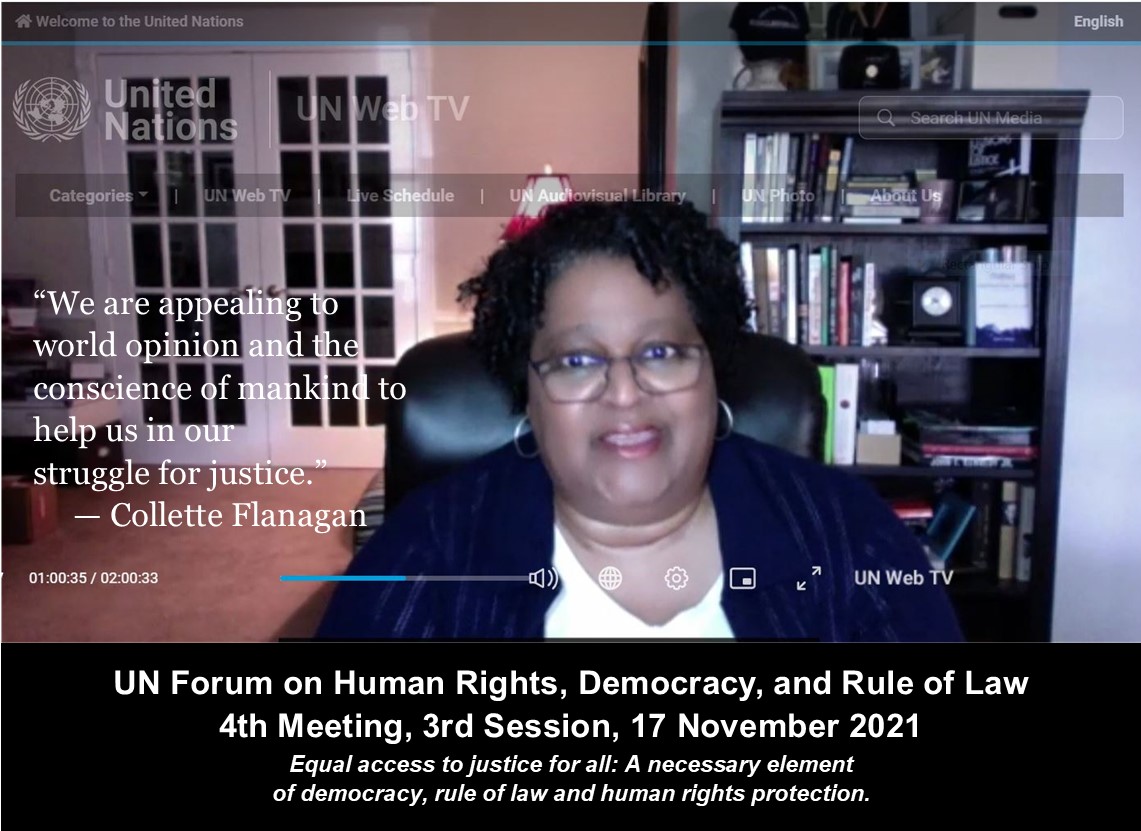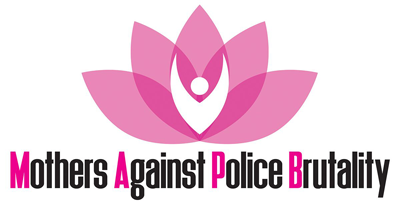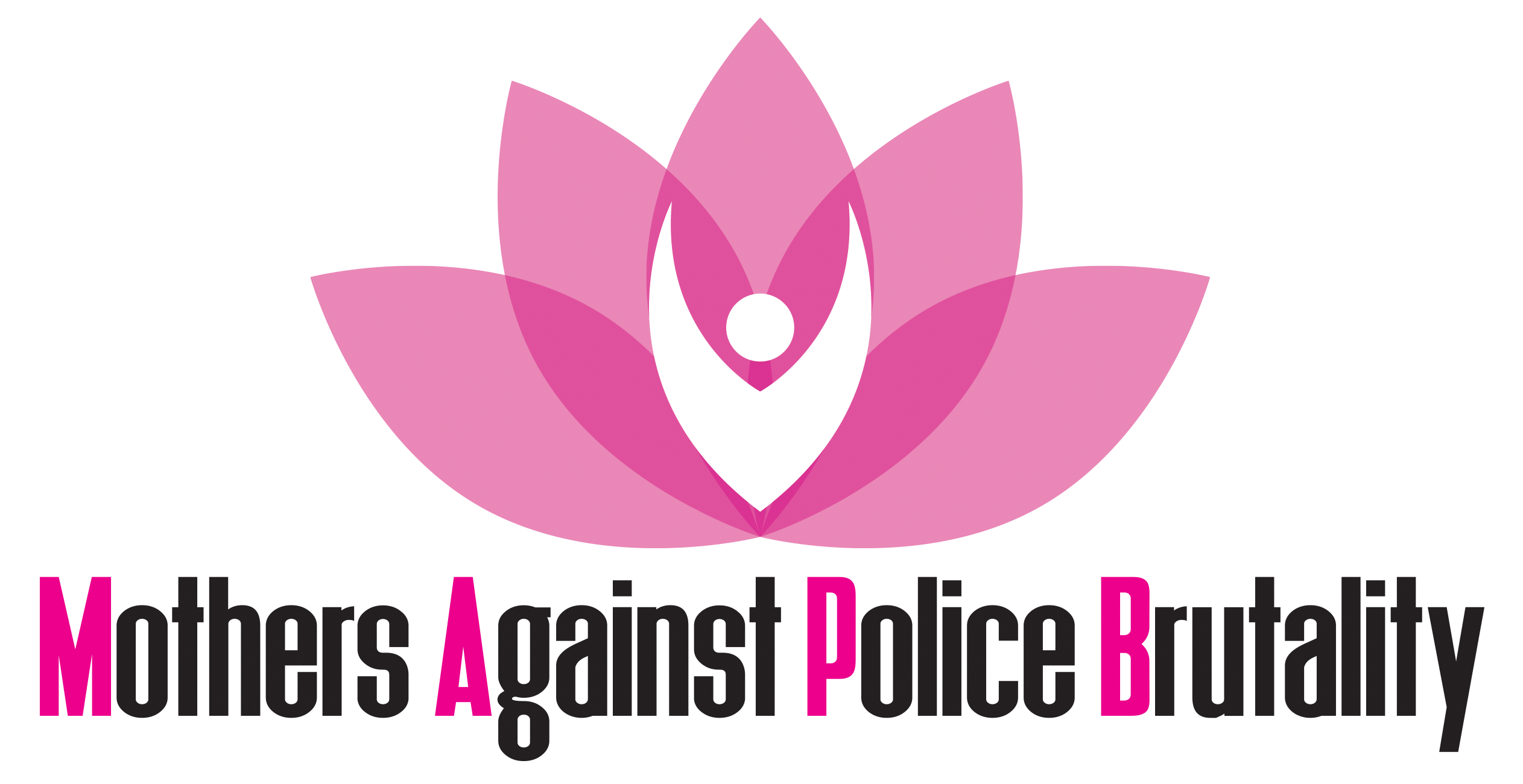

Collette Flanagan
“We appeal to the conscience of mankind in our struggle for justice.”
Remarks to the Forum on Human Rights, Democracy and the Rule of Law
November 17, 2021
Good morning,
It’s a pleasure to be here today with my esteemed colleagues in Human Rights advocacy.
I founded Mothers Against Police Brutality because the police in Dallas, Texas, killed my only son, Clinton Allen, an unarmed young Black man, father of twin boys, on March 10, 2013. Clinton was shot seven times – five times in the chest, once in the left upper arm, and once at close range in the back. Clinton was only 25 years old.
After Clinton’s murder by a Dallas officer, the indifference that was shown to our family by the leadership of the police department and the district attorney’s office is unfortunately the norm of what happens to families when a loved one is killed by the police. In most cases, families are only contacted initially when their loved one has been killed by a policeman and then all communication ceases. Many families that have lost loved ones through police violence find themselves isolated from the police investigation, left with no answers other than “your child is dead” and certainly no compensation of any kind.
We learned while investigating my son’s case that the Dallas County District Attorney did not perform its own investigations of officer-involved-shootings. Instead, at that time, the DA would take the police department’s investigation of its officers – of itself, actually – and merely rubber stamp it. In Clinton’s case, the DA ignored sworn, notarized statements from 5 witnesses that my family and I collected.
After years of protest, Mothers Against Police Brutality convinced the DA to establish a civil rights unit to conduct investigations of police shootings. The first indictment in four decades of a Dallas officer involved in a fatal shooting followed. In fact, until that indictment in June 2017, every single fatal police shooting in Dallas, Texas, since 1973 had been found to be “justified.” No charges, no indictments, no trials, no punishment for an uninterrupted span of more than 44 years. Up to this day, today, the day of our hearing, only one Dallas officer has been convicted since 1973. And this, despite literally hundreds of deadly police shootings.
MAPB has a network of over 400 families who have suffered this inconsolable loss, and unfortunately it grows monthly. MAPB works from a unique perspective. We see police brutality through the lens of our own lived experience. We see it through the eyes of Mothers and families who have lost their children and loved ones to police beatings and shootings throughout the United States.
When you work from this perspective, from the lived experienced of losing a child to extra-judicial killing by police, you have the opportunity to understand the total impact and devastation that most people never see. MAPB lifts up the many victims that you have never heard of because, unlike George Floyd, their egregious deaths did not make the national or the international news. The police killings that are reported in the U.S. national media represent only a minuscule proportion of the people actually killed by police.
The federal government’s haphazard attempts to even count the number of people killed by the nation’s 18,000 police agencies have been shown to undercount the total by 50% or more. The lack of accountability for data on police killings also applies to prosecutions, where the handful of indictments and convictions of police, who kill a thousand people each and every year, is statistically insignificant. There are virtually no repercussions for police officers who kill.
This lack of accountability for use of excessive and deadly force against the public is a key part of the toxic culture found in most in U.S. police departments. These extrajudicial killings that have become a routine part of law enforcement. They happen literally every day. There is a Derek Chauvin on every police force in the U.S. More than one. The long history of racism in this country is still alive and well in our police departments – from the slave patrols riding out of the house of bondage during our enslavement to today’s over-policed Black and Latinx neighborhoods.
In the U.S. Black Americans are killed at a much higher rate than white Americans. Although half of the people that are shot by US policemen are white, Black Americans are shot at an undeniably disproportionate rate. Black Americans account for 13% of the U.S. population, but are killed by the police at more than twice the rate of white Americans. According to data compiled by The Washington Post, Black people are shot to death by police at a rate of 37 per million; the rate for whites is 15 per million.
This bias in use of deadly force is well documented in everyday policing as well. The scholarly journal Nature: Human Behaviour reported last year an analysis of more than 100,000 traffic stops throughout the U.S. Researchers concluded: “Our results indicate that police stops and search decisions suffer from persistent racial bias.”
We know that action against police brutality through protest and policy change can make things incrementally better – for example, reforms outlawing certain chokeholds. But I have to share with you that these reforms are no match for the deep currents of racism and brutality that run through our police departments.
Incremental reforms are not enough.
I want to re-emphasize that police brutality is a national crisis, and we need a nationwide movement, a national strategy, and national legislative and policy changes to end it.
We, therefore, need a national standard for the use of deadly force. We need federal investigators and prosecutors on every case of fatal police violence. The district attorneys and county prosecutors of this nation have utterly failed to hold accountable police officers who kill us. Look at the facts. A police officer can do anything to you in this country, even kill you, and in 995 cases out of a thousand nothing will happen. No charges, no indictment, no trial, no punishment.
As High Commissioner Michele Bachelet noted in her report, the guilty verdict and sentencing of Derek Chauvin represent the exception rather than the rule when it comes to accountability for police killings of Black men and women in the United States.
We also need to provide compensation for victims of police brutality and for the families who lose their children to official homicide. Compensation is often denied under the various state laws and programs concerning victims of crime. Large legal settlements for “wrongful death” are occasionally reported in the media, but most families are left with nothing but their grief. During the U.S. occupation of Iraq, many of us were surprised to learn that when American soldiers killed Iraqi civilians, compensation was provided to the families of the victims. Shall such payments made in a war zone, however commendable, be denied to the families of U.S. citizens killed here at home by our own government?
Let me close by saying that police abuse of citizens is a worldwide phenomenon, and we are beginning to see more protests around the world. We understand the necessity for global solidarity. For our struggle to be successful, we need international pressure on the United States to end police violence against the public. Thank you.
[Here followed testimony from other international advocates. Each witness then was provided an opportunity for closing remarks.]
Collette Flanagan / Closing Remarks
I want to thank the organizers of this event. We must keep the crisis of police brutality in front of the public and policy makers. We cannot allow this stain to continue, this literal stain of blood on the social contract.
Because law enforcement abuse of human rights plays out at the local level, at the hands of local officials, we sometimes can’t see the breadth of the crisis.
Our condition is like that of Black people across the southern states in the 1960s whose right to vote was routinely denied. Then the right to vote for Black citizens was blocked by the local county registrar or election department. But that right is guaranteed in the Constitution, and Martin King, Fanny Lou Hamer, John Lewis, and others rightly demanded a national response to the ongoing massive violation of our Constitutional right to vote.
The people killed by police daily in our country, we should remember, have not been convicted of any crime, certainly not one punishable by death. Should our right to life, liberty, and equal justice under law be denied by any police officer with a gun, or by any one of the district attorneys in the 3,000 counties of the United States? Does the Constitution not apply in every one of those counties? The Civil Rights Generation said it does. And so do we.
I also strongly believe that a robust international accountability mechanism would support and complement, not undermine, efforts to dismantle systemic racism in the United States, including by the Biden administration.
We are seeking international solidarity in our struggle, which is also your struggle.
In bringing this crisis to the United Nations, we are reminded that the last campaign of Malcolm X was to bring the struggles of Black people in the United States to the international arena of human rights. Malcolm X was nothing if not a realist when it came to the issue of justice for Black people, but the international community lifted his hope.
I’d like to share with you that hope, which is our hope also, in Malcolm’s own words from his 1964 Outline for Petition to the United Nations:
After three hundred years of slavery and caste oppression, unmitigated terror and torture, physical and otherwise — which continues today though opposed by every means possible of human conception — we feel the United Nations must give a hearing to the plight of [. . .] Black Americans.
After years and years of supplication, petitioning, pleading and agitation for affirmation of basic human rights, all to no avail, we see no recourse but to put our case to you the representatives and delegates to the United Nations. We come to you because we see in your deliberations and debates and the accords which often issue forth, where and how the conscience of mankind can be utilized as an invaluable aid in righting wrongs and securing peace, and understanding and well-being. We see the United Nations as the institution wherein world opinion and the conscience of mankind can be appealed to.
[Reprinted from Clarke, John Henrik, ed. 1990. Malcolm X: The Man and His Times. Africa World Press, Trenton NJ; see Appendix II, p. 344. Online: https://keyamsha.com/2014/03/13/charging-genocide/.]
Mothers Against Police Brutality stands in this tradition, appealing to world opinion and the conscience of mankind to help us in our struggle for justice. Thank you.
